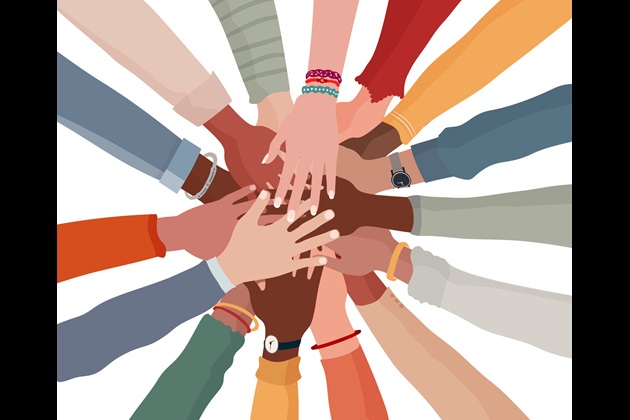Larissa has set up a workplace inclusion café to celebrate diversity and empower nursing staff to deliver the best care for patients
When Larissa Derreck arrived at university to study to become a children’s nurse, she was shocked to find that different cultures weren’t always embraced in the way she was used to. She’d been brought up in an area where multiculturalism was the norm.
For the first time in her life, she felt she didn’t quite fit in. Comments were made that made her feel uncomfortable. She never escalated her concerns, instead she blamed herself and worried there was something wrong with her.
I imagined how I would feel if my own sister was treated like this and that was something I couldn’t accept
But when she reflected on what was happening, she realised it was other peoples’ reactions that were the problem. She hadn’t done anything she shouldn’t have.
“One person couldn’t pronounce my name correctly. She didn’t even bother trying – she just shortened it. That hurt,” Larissa remembers.
“I was brought up to understand that names have power, and some are chosen because of their meaning – perhaps ‘you are great’ or ‘you are loved’. If someone disregards your name, it can feel they are disregarding you and this, in turn, makes me feel uncomfortable around them.”
Larissa knew that she wanted to do something about this.
“I imagined how I would feel if my own sister was treated like this and that was something I couldn’t accept,” she says.
“A tutor gave me some advice that made me think about my own perceptions too. ‘You need to engage and socialise with people who don’t look like you,’ she said, and it was good advice. The world is too big to be narrow-minded.”
Benefits for patients and staff
Now working as a children’s nurse in a high dependency unit in the Royal Brompton & Harefield NHS Foundation Trust, Larissa has taken action to ensure others don’t feel like she did at university, by setting up and running a workplace inclusion café.
“All staff should be able to work in an environment where they feel safe and diversity is celebrated,” she says.
“But I still had my doubts. I worried that if I suggested running something like this I’d be perceived as over-anxious, and my ideas would be dismissed.”
Larissa’s fears were unfounded. She confided in a senior member of staff and together they started to plan the resources needed for the project, before going to the Head of Children’s Services to make their case.
All staff should be able to work in an environment where they feel safe
“I was clear from the outset that it wasn’t only staff who would benefit from the café, but in the long-term it could have a positive impact on our patients too.
"This was a chance for staff to develop a deeper understanding of their patients’ needs and deliver the best care to children from all backgrounds.”
In putting her case forward, Larissa argued that for people to be the best they can be, everyone needs to work together.
“If we ignore the cultural challenges some people face, we have to accept this will have an impact on their work as a nurse.
"Their anxieties will start to show in their work. People may start believing they’re better off ‘under the radar’ and feel too scared to face issues head-on.”
Safe spaces
“Inclusion cafés provide safe spaces for dialogue about difference to happen and help create meaningful connections. Larissa’s work in this area is amazing. None of us are born with the knowledge about how to make constructive use of the full range of human differences. Inclusion cafés offer us all an opportunity to start to build our knowledge and skill in this area.”
RCN equalities lead Wendy Irwin
Celebrating diversity
With administration time given to her, Larissa set about opening the café to staff.
Initially it was mainly attended by colleagues from Larissa’s department but now staff working elsewhere have taken an interest and inclusion champions are being recruited on other wards to spread the word.
The supportive sessions cover a range of issues that celebrate diversity while providing practical advice and space for interesting discussion, including a book club and a documentaries review.
“We discuss all kinds of relevant issues such as imposter syndrome, unconscious bias, protecting mental health and protected characteristics,” Larissa says.
“When we were able to hold face-to-face sessions, sometimes in an actual café where people could relax with a cup of tea and a biscuit, we usually had around 10 people come along to individual sessions. It’s very friendly and very safe. People leave with the tools they need to address their worries and any support they need if they feel that issues need to be escalated.
“The pandemic hasn’t stopped our work, but we’ve had to move to MS Teams which isn’t always ideal, but does ensure the conversations continue."
Reaching out to the community
Such is Larissa’s passion to support people, her work continues when she leaves the hospital. In her own time, she runs a community interest company called Live Your Movie. It’s there to empower and unite black communities but is open to anyone who relates to the issues.
“It’s about addressing the conflict of identities so many people face as they struggle to work out where they fit in. It’s about showcasing role models to teenagers, identifying with their struggles, addressing mental health issues, helping them understand how to positively deal with their concerns and being strong enough to write their own chapters in their own movies.
This is a multicultural world and we all need each other
"I can’t wait for us to be able to get back out into the community into schools to get these messages across in our workshops.
“Inclusivity makes the world go around and understanding each other is a step towards positive change. This is a multicultural world and we all need each other. This is my way of bringing a solution to the table."
The compassionate care programme
The RCN worked with the Royal Brompton and Harefield NHS Foundation Trust to develop a compassionate care programme for their nurse leaders in band 6 and 7 roles.
Evaluations have shown the programme re-energises the workforce, who are equipped to lead sustainable change, in a culture where it’s safe to ask patients and staff about their feelings.
Now in its sixth year, the programme was recognised by the Care Quality Commission as an area of outstanding practice, encouraging clinical and service innovation at all levels.








